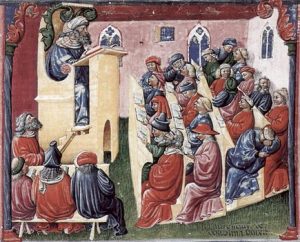Next Monday, without shame, I’ll be doing something that many people these days frown on, though it has been a valued part of education for centuries. I’ll be giving a lecture, the first in a course of ten that will run weekly until late October. Lecturing! What a shockingly antiquarian practice!
I’m familiar with the usual arguments against lecturing. It’s said to be an incorrigibly authoritarian, top-down, monologic way of imposing an individual’s views on a docile group of listeners. It supposedly discourages independent learning and gives the lecturer a licence to parade his or her ego.
No doubt all of this can too often be true. But need it always be? Is it self-deceptive to think I understand those potential problems well enough to mitigate them when I stand at a lectern?
Many years ago, in The Making of Literature, I wrote about the importance of ensuring that a teacher engages a class actively in the learning process, combining the roles of “a resource specialist, who puts the learner in contact with useable information, and a response specialist, with whom the learner can negotiate and test particular communications.” The format of a lecture may not always facilitate this kind of engagement, but doesn’t preclude it either. Much depends on the nature of the group, particularly the motivations of its members, the knowledge and interest they bring to a session, and their level of maturity.
This particular course of mine is for the Peel (Mandurah) branch of MALA, the Mature Adults Learning Association. Knowing MALA members well, I can be confident that, while I’m responsible for much of the content that we explore together, they will bring a spirit of active enquiry to what we discuss. I’ve expressed my enthusiasm for groups of this kind in a previous blog post, ‘In Praise of Older Readers.’
In medieval universities a lecture was simply, as the French-derived word suggests, an oral reading from some text along with a commentary on what was being read. Its purpose was to impart knowledge of the text and instruct the audience in how to interpret it. Today, books are so readily available in so many ways that it may seem needless for a lecturer to read aloud even a few select passages from a chosen text. Why not leave it entirely to students to do their own silent reading? Answer: because well-written words sometimes deserve to be voiced. By reading a passage aloud, an experienced lecturer can draw attention to certain nuances of phrasing. This serves to model the process of interpretation. Marks on the page don’t supersede the spoken dimension of language.
The topic for my course is Myth in Literature and Society. ‘Myth’ signifies a range of things, from mere fallacies to fabulous old tales of gods, superheroes, creation and destruction. Why does the word have such diverse meanings? Why do many myths have long-lasting appeal? Why do creative writers go on retelling and adapting mythical stories? What can myths tell us about the societies that produced them, and what relevance can they still have in our own time and place? In exploring such questions, this course draws examples from literary sources, mainly in the western tradition (e.g. Greco-Roman classical drama, poetry and epic; biblical stories; medieval romances; Shakespearean plays), as well as from cultural practices, ancient and modern.
MALA is still accepting late enrolments. If you’re interested, click on this information.
I’ll also be presenting a different lecture course, beginning the following week (on Wed 22nd August), for the Rockingham branch of MALA. This one is on Historical Fiction. Details here.
